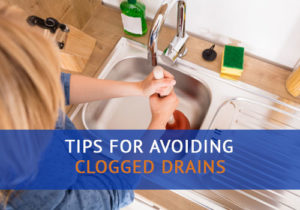Many calls we get begin with: “I think my septic tank is full. Can you come out and pump it?” While in some cases this is true, septic tanks usually only need to be emptied every 3-5 years. More often, the causes are clogged drains.
Also, many of the items and practices causing drain clogs negatively impact your septic system as well. Here are a few tips for avoiding clogged drains while saving you a potential septic repair.
Tips for Avoiding Clogged Drains
Avoiding Bathroom Drain Clogs
Regularly Remove and Clean the Stoppers
The leading causes of bathroom clogs are built-up dirt, skin and hair. Soap acts as a binder, causing the build-up to harden and act as a stopper—effectively stopping the flow of water.
Have lots of housemates with lots of hair? Spend the extra money for a heavy-duty drain stops designed to catch all hair clumps.
Stop Flushing Non-Flushable Products
The main culprit? “Flushable” wipes. The general rule of thumb is as follows: unless it is toilet paper, don’t flush it.
This includes cotton swaps, paper towels, feminine hygiene products, floss, q-tips and any type of “flushable wipes”. These products are not water soluble, leaving them ample chance to cling and clog the drains.
Kitchen Sink Backups
 Say No to Grease
Say No to Grease
While grease is inevitable, using your drain as a disposal system is. Grease and oils cling onto drain walls with all of their might, slowly growing every time you pour a little down the drain.
Next, you add in food particles and soap and you have one sticky clog.
Stop Treating the Garbage Disposal Like a Trash Can
Yes, it works like magic. No, you shouldn’t put everything down it.
Perhaps one of the worst kitchen inventions for your drains and septic systems, garbage disposals encourage throwing large food scraps into the sink. But, this is killing your system.
While some foods are okay, most are too heavy, starchy or hard. Check out this full list of things to avoid putting down your garbage disposal.
Laundry Room
Install a Lint Catcher on Your Washing Machine
Lint, hair, dirt, bits of fabric, and even the occasional sock (so that’s where they go) are drained out of the tub after every wash. Eventually, this build-up plugs your drain.
A simpler solution than moving the heavy washer out of the way for repairs is installing an affordable lint filter, purchasable online or at your local hardware store.
Preventative Maintenance for Avoiding Clogged Drains
Don’t wait until a repair is needed. Instead, pay attention to the signs.
If your sinks, drains or toilets drain slowly or gurgle, contact your local Drain Repair or Plumber immediately. After all, a cleaning service costs significantly less than a repair and pipe replacement.
Your septic systems and drains are sensitive and they can only take so much. Avoiding clogged drains with standard good practices cuts out repair costs and keeps your septic system happy. For more information or questions about Do Not Flush Rules for septic systems, contact Advanced Septic Services of Clermont, FL today.

